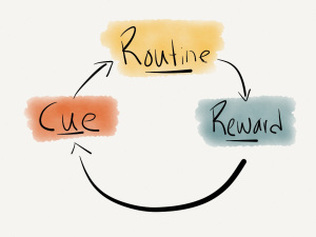Blog
Postings arise as time permits
and inspiration hits. Contact me
to request a special topic!
and inspiration hits. Contact me
to request a special topic!
|
"Practice doesn't make perfect. Practice makes permanent." Sound familiar? This idea of habit formation has been central to my most recent "Lap Four" goal - see my earlier post if you're confused. Historically, I have problems with consistency. One day I play a brilliant concerto, the next I forget how to slur an octave. Home run, strike out. In my multifaceted approach to solve this problem (and subsequent random internet surfing), I came across several videos, web resources, and a book by New York Times writer Charles Duhigg. He describes the "Habit Loop," which led me to two important realizations:
 I set out to deconstruct my habit loop. CUE: Public performance. ROUTINE: Freak out, lose control. REWARD: An "engaging" performance. Sometimes this is a euphemism, sometimes not. Here's his story, the cookie-based version of my bassoon habit: After months of diligent work refocusing on the reward - engaging an audience with a musical experience - I finally stepped beyond my most recent plateau. I played in a master class, and, for the first time in what felt like forever, I was happy with what I presented.
I played representatively. I played how I play when I'm alone. I played how I play when I am having fun. *gasp* A friend of mine asked me later that evening what I felt to be the biggest change in my playing over the past several months, and I gave him a highly inadequate answer. (So, this post is partially for you, Adam!) I gave him a technical answer. I did blah blah to my reeds and think of my sound as blah blah and by body blah. Blah. After more reflection, here's the real answer: I practiced right. By "right" I don't mean that I was practicing wrong before. I mean I practiced being right and knowing I could be right. I practiced being right more than I was being wrong, which I had always before thought of as a waste of time. However, it stands to reason that we will always do what we have always done. If nine times out of ten you crack a note, that one success only means that you have a 10% chance the next time around. Play it correctly ten times in a row, then your chances just over 50% (11 rights for 9 wrongs). Math! I stopped practicing to be perfect, and I started practicing to be permanent. I practiced right, and it felt right. Go give it a shot, and let me know what you think!
2 Comments
Steve Hanna
11/26/2013 12:04:14 pm
Cayla: yes, yes, yes. I start talking to my students about this from our earliest days together. Your fingers don't know the difference between the right note and the wrong one. They are constantly learning new habits, but it is up to us to supervise the process to ensure the habits are good ones. Fingerings, enbouchure, air column, reed-making, all are subject to this law of learning.
Reply
Cayla
12/7/2013 02:52:41 am
Absolutely. Habits are even harder to break when we're accidentally training ourselves to keep them.
Reply
Leave a Reply. |
Archives
October 2020
Categories
All
|